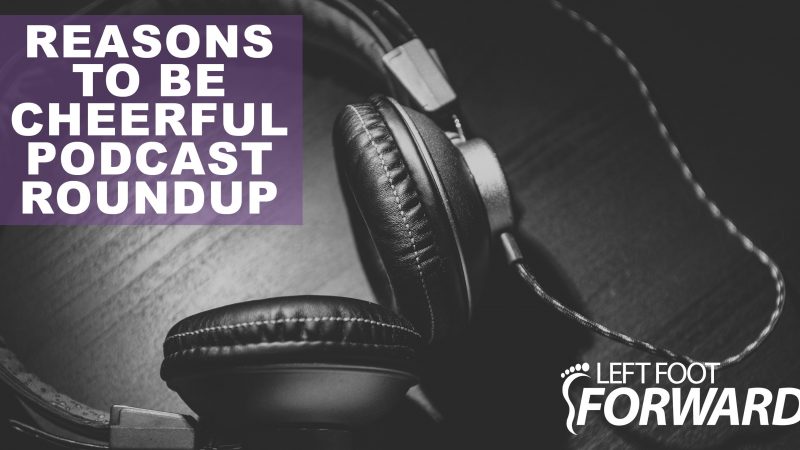A roundup of the Reasons to be Cheerful Podcast

In our latest instalment of our roundup of the Reasons to be Cheerful podcast, I take a look at five takeaways from the episode on ‘FIGHT FOR YOUR RIGHTS: Learning from the US campaigns to organise at Amazon and Starbucks’, on how workers have managed to secure a wave of union victories at the likes of Amazon and Starbucks. What lessons do these victories hold for workers and unions in the UK and what made them so successful?
1.What lies behind unionisation among Starbucks workers?
Starbucks workers began efforts to unionize at a store in Buffalo, New York, despite the company’s objections, over the pandemic period, in a bid to secure better pay and conditions.
The directors and managers at Starbucks were so rattled that they decided to send Howard Shultz, currently the chief executive officer of the Starbucks, to Buffalo. Workers were told that if they dared to unionise then they could lose their health insurance as well as their college tuition. Starbucks organiser Casey Moore tells Ed Miliband and Geoff Lloyd that workers in Buffalo took inspiration from a local coffee store that set up a number of branches and whose workers decided to organise.
Casey said: “It doesn’t take a lot of people, it just takes one shop, one store to say I want to make a difference and go from there”. What’s particularly interesting is how young people were driving efforts to unionise. “Our generation is turning to unions and saying there’s no reason it has to be like this and we can make a difference”, said Casey.
2. What lessons can the UK learn from union victories in America?
Director of CLASS, Ellie Mae O’Hagan tells the podcast that there are several lessons for UK workers and unions, including on the need to take advantage of the tech that we have, for example apps like Whatsapp and telegram where workers can join groups and talks among themselves uncensored with no management around.
She adds: “One of the reasons that unions have been historically been seen as male dominated is because men tend to generally have more free time and fewer caring responsibilities to go to in person meetings and what we see with Amazon and others is that people will join zoom events that they can do from home while caring for their children.”
For e.g. the NEU in 2020 held an online organising zoom call which nearly 500,000 people joined.
Ellie says it’s also important to note how the traditional way we see union organising has changed, with Starbucks and Amazon workers taking the lead in unionising.
3. UK conditions have become more and more unfavourable to unions and organising
The director of CLASS highlights how UK conditions have become more and more unfavourable towards unions and organising. A report by CLASS entitled ‘The insecure economy’, found that insecurity across the entire jobs market has increased massively since 2005.
In the hospitality sector insecurity in workplace has doubled since 2005 and the think tank found that across all industries all jobs are becoming more insecure and our jobs market has become ‘more savage’.
4.How do unions appeal to young workers?
The General Secretary of Prospect Union, Mike Clancy tells the podcast that he’s never bought into idea that ‘younger people are a different political species who don’t share the same value set as other generations in the workforce’.
“My experience is that unions are a mystery to younger people partly because of the way unions organise themselves. The challenge is for unions to reimagine themselves make themselves available in a different way”, he says.
“Unions have got to be more humble, we shouldn’t look like we have all the answers. What younger people want is a more nuanced constructive criticism of their employer when its justified but they also want to be able to get on. So our approach is to say we can help you get on or if necessary we can help you get even, but we tend to lead with getting on, helping people meet their aspirations with their employer and the labour market and to develop themselves.”
5. Did the pandemic result in increased unionisation?
The director of CLASS says that the job insecurity of the pandemic created an urgent need for people who work to protect themselves and opened doors to a new era of organising. Highlighting the example of the Marriott hotel who furloughed directly employed staff while refusing to furlough contracted staff, leading to a campaign and organising which led to the agency workers finally being given furlough terms and conditions as well as £10,000 each in backdated pay, Ellie says that “what’s happening is that people are suddenly realising that if they don’t stand up for themselves they can be walked all over”.
It’s a feeling shared by Mike Clancy of Prospect who says that the Prospect saw a spike in members joining during the pandemic.
Basit Mahmood is editor of Left Foot Forward
Left Foot Forward doesn't have the backing of big business or billionaires. We rely on the kind and generous support of ordinary people like you.
You can support hard-hitting journalism that holds the right to account, provides a forum for debate among progressives, and covers the stories the rest of the media ignore. Donate today.



